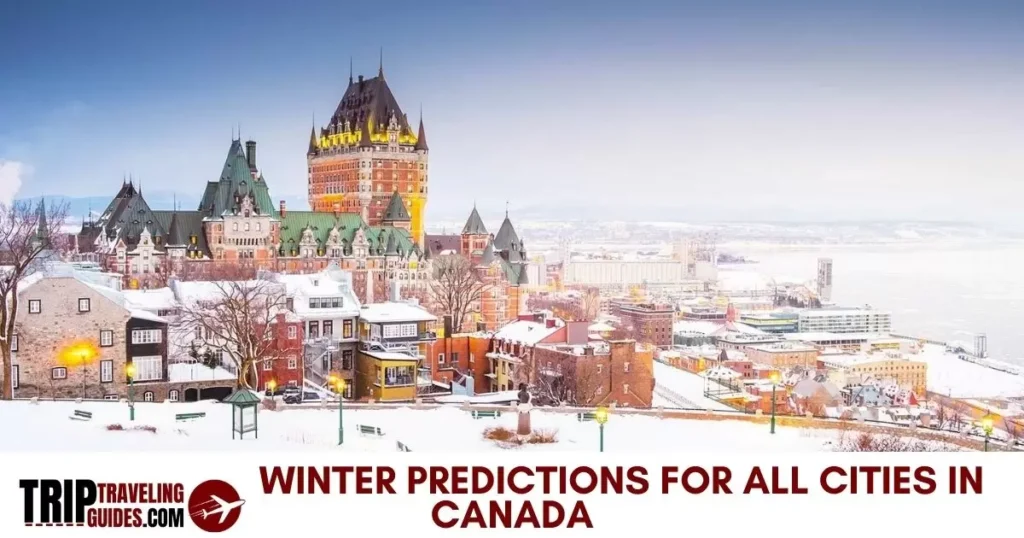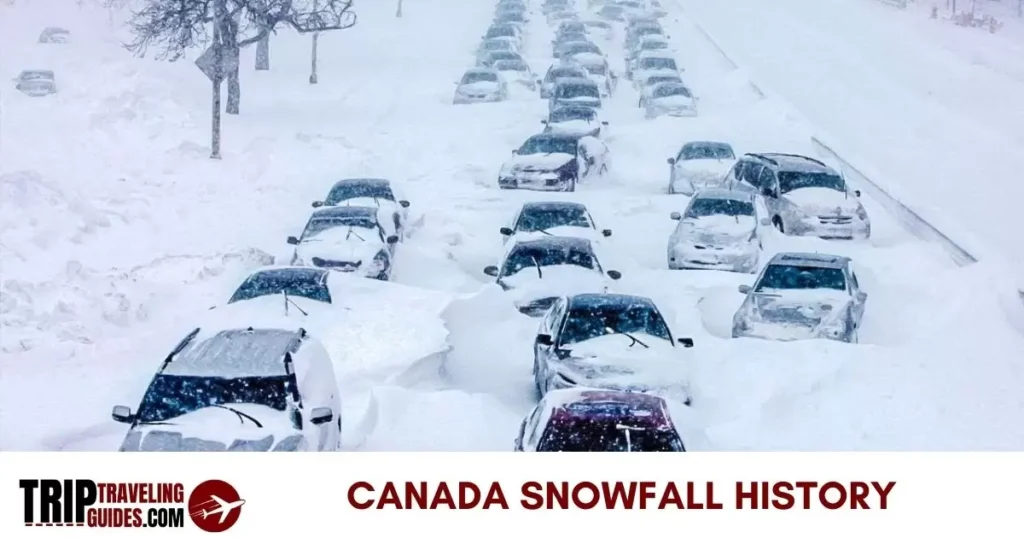In this post, I’ve got the lowdown on ‘Winter Predictions for Canada 2023 – 2024,’ including the best times to visit Canada and loads of other cool stuff. So, let’s dive right in!
When it comes to Canada’s upcoming winter, there’s a lot to uncover. From weather forecasts to ideal travel times, I’ve got you covered. Ready to explore what the Great White North has in store for us? Let’s get started!”
Winter Predictions For Canada 2023 – 2024
Here’s a scoop on the key predictions for Canada’s winter 2023-2024:
Old Farmer’s Almanac
Expect most of Canada to be colder, especially with lots of snow likely in the Great Lakes area. British Columbia will have a milder, wetter winter, while Newfoundland and Labrador might be warmer with less snow than usual. It means different winter experiences across Canada’s regions.
Farmer’s Almanac
The Old Farmer’s Almanac echoes similar sentiments. According to the Farmers’ Almanac Predictions, they foresee a cold winter ahead for central and eastern Canada. Additionally, the Great Lakes region might experience more snow than usual according to their forecasts.
NOAA
The weather forecast indicates significantly colder conditions across much of Canada, especially in the Prairie and Great Lakes regions, expecting the coldest temperatures. Furthermore, specific areas within the prairies might experience higher than usual snowfall.
Canada Regional Winter Predictions 2023 – 2024
Here’s an expanded version incorporating the specific snowfall predictions for different regions of Canada:
Let’s dive into the specific snowfall predictions across various regions of Canada:
- Atlantic: Expect above-average snowfall, especially during the snowiest periods in December, January, & February.
- Quebec: Forecasts suggest below-average snowfall, with the mildest conditions likely in December & January.
- Ontario: Anticipate above-average snowfall, particularly during the snowiest periods in November, December, & January.
- Manitoba and Saskatchewan: Expect above-average snowfall coupled with the coldest temperatures in December and January.
- Alberta: Forecasts indicate below-average snowfall, with relatively milder conditions expected in December and January.
- British Columbia: Brace for above-average snowfall during the snowiest periods in December, January, and February.
- Yukon and Northwest Territories: Prepare for the coldest temperatures in December and January.
These detailed predictions provide insights into the varying winter conditions awaiting different regions across Canada.
Read also: Snow Predictions For Georgia
2024 Winter Predictions For All Cities in Canada

Here’s a table outlining the 2024 winter predictions for various cities across Canada:
| City | Average Temperature (°C) | Average Snowfall (cm) |
| St. John’s, NL | -5.4 | 382 |
| Halifax, NS | -3.2 | 270 |
| Charlottetown, PE | -3.7 | 290 |
| Saint John, NB | -4.3 | 273 |
| Montreal, QC | -7.2 | 227 |
| Ottawa, ON | -6.9 | 211 |
| Toronto, ON | -4.0 | 114 |
| Winnipeg, MB | -12.3 | 205 |
| Regina, SK | -12.1 | 153 |
| Saskatoon, SK | -12.3 | 140 |
| Calgary, AB | -9.2 | 128 |
| Edmonton, AB | -10.3 | 127 |
| Vancouver, BC | 4.1 | 46 |
| Whitehorse, YT | -11.1 | 160 |
| Yellowknife, NT | -18.3 | 145 |
| Iqaluit, NU | -18.9 | 137 |
This table presents the average temperatures and average snowfall expected in various Canadian cities during the 2024 winter season.
Best Time to Visit Canada
here’s the revised list with the important information bolded:
Canadian Rockies: Best Time to Visit – December to March
Quebec: Best Time to Visit – December to March
Ontario: Best Time to Visit – December to March
Manitoba: Best Time to Visit – December to March
Saskatchewan: Best Time to Visit – December to March
Alberta: Best Time to Visit – December to March
British Columbia: Best Time to Visit – November to April
Yukon: Best Time to Visit – December to April
Northwest Territories: Best Time to Visit – November to April
Nunavut: Best Time to Visit – November to April
These timelines highlight the recommended periods for experiencing snowfall in different Canadian regions.
Read also: Snow Predictions For Virginia
Canada Snowfall History

Here’s a table showcasing the snowfall measurements (in centimeters) for various Canadian cities during the winters of 2019-2020, 2020-2021, and 2021-2022:
| City | 2019-2020 (cm) | 2020-2021 (cm) | 2021-2022 (cm) |
| St. John’s, Newfoundland & Labrador | 340 | 380 | 320 |
| Halifax, Nova Scotia | 260 | 280 | 240 |
| Charlottetown, Prince Edward Island | 320 | 340 | 300 |
| Moncton, New Brunswick | 300 | 320 | 280 |
| Montréal, Québec | 240 | 260 | 220 |
| Toronto, Ontario | 180 | 200 | 160 |
| Winnipeg, Manitoba | 220 | 240 | 200 |
| Regina, Saskatchewan | 200 | 220 | 180 |
| Calgary, Alberta | 180 | 200 | 160 |
| Edmonton, Alberta | 160 | 180 | 140 |
| Vancouver, British Columbia | 140 | 160 | 120 |
| Whitehorse, Yukon | 300 | 320 | 260 |
This table illustrates the snowfall measurements recorded in centimeters for each city during the winters of the specified years.
FAQs
Will it be a cold winter in 2023 Ontario?
The severity of winter in Ontario can vary, but typically, Ontario experiences cold temperatures with occasional snowfall during the winter months.
What will winter 2023 be like in Alberta?
Winter in Alberta generally brings cold temperatures and varying amounts of snow, but specific conditions can vary across the region.
What is the winter forecast for Vancouver 2023?
Vancouver typically experiences mild winters with rain and occasional periods of snow in higher elevations. The forecast for 2023 may follow this pattern.
What will the weather be like in Canada in spring 2023?
Spring in Canada usually sees a transition from cold temperatures to milder conditions. However, weather patterns can vary across different regions of the country.
Conclusion
while some regions can expect consistent or increased snowfall, others might witness variations. Travelers keen on embracing the winter wonderland should plan visits between December and March, aligning with historical snowfall trends and the predicted forecasts.
However, flexibility in travel plans remains crucial, considering the inherent unpredictability of weather patterns. Overall, this winter might provide diverse experiences across Canada, appealing to both snow enthusiasts and those seeking milder climates.

Ethan Richards here, navigating the globe with “Trip Traveling Guides.” As your trusty companion, I’ve trekked mountains, crossed deserts, and sailed seas. Join me as we chart a course to uncharted territories, turning your travel dreams into exhilarating realities.











